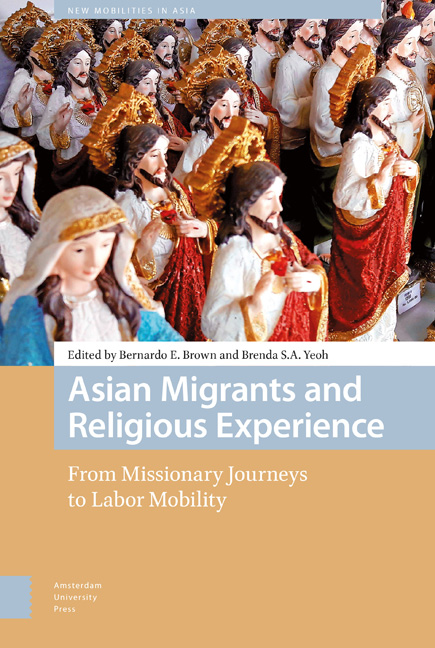Book contents
- Frontmatter
- Contents
- List of Illustrations
- Acknowledgments
- 1 Introduction: Human Mobility as Engine of Religious Change
- Section 1 Mobile Religious Practices
- 2 Saving Yogis: Spiritual Nationalism and the Proselytizing Missions of Global Yoga
- 3 Renewed Flows of Ritual Knowledge and Ritual Affect within Transnational Networks: A Case Study of Three Ritual Events of the Xinghua (Henghua) Communities in Singapore
- 4 Liberalizing the Boundaries: Reconfiguration of Religious Beliefs and Practice amongst Sri Lankan Immigrants in Australia
- Section 2 Transnational Proselytizing
- 5 From Structural Separation to Religious Incorporation: A Case Study of a Transnational Buddhist Group in Shanghai, China
- 6 “10/40 Window”: Naga Missionaries as Spiritual Migrants and the Asian Experience
- 7 Religion, Masculinity, and Transnational Mobility: Migrant Catholic Men and the Politics of Evangelization
- 8 Helping the Wounded as Religious Experience: The Free Burma Rangers in Karen State, Myanmar
- Section 3 Refashioning Religiosity in the Diaspora
- 9 A Multicultural Church: Notes on Sri Lankan Transnational Workers and the Migrant Chaplaincy in Italy
- 10 “Bahala Na Ang Diyos”: The Paradox of Empowerment among Filipino Catholic Migrants in South Korea
- 11 Feeling Hindu: The Devotional Sivaist Esthetic Matrix and the Creation of a Diasporic Hinduism in North Sumatra
- 12 Afterword: What Makes Asian Migrants’ Religious Experience Asian?
- References
- Index
5 - From Structural Separation to Religious Incorporation: A Case Study of a Transnational Buddhist Group in Shanghai, China
Published online by Cambridge University Press: 12 December 2020
- Frontmatter
- Contents
- List of Illustrations
- Acknowledgments
- 1 Introduction: Human Mobility as Engine of Religious Change
- Section 1 Mobile Religious Practices
- 2 Saving Yogis: Spiritual Nationalism and the Proselytizing Missions of Global Yoga
- 3 Renewed Flows of Ritual Knowledge and Ritual Affect within Transnational Networks: A Case Study of Three Ritual Events of the Xinghua (Henghua) Communities in Singapore
- 4 Liberalizing the Boundaries: Reconfiguration of Religious Beliefs and Practice amongst Sri Lankan Immigrants in Australia
- Section 2 Transnational Proselytizing
- 5 From Structural Separation to Religious Incorporation: A Case Study of a Transnational Buddhist Group in Shanghai, China
- 6 “10/40 Window”: Naga Missionaries as Spiritual Migrants and the Asian Experience
- 7 Religion, Masculinity, and Transnational Mobility: Migrant Catholic Men and the Politics of Evangelization
- 8 Helping the Wounded as Religious Experience: The Free Burma Rangers in Karen State, Myanmar
- Section 3 Refashioning Religiosity in the Diaspora
- 9 A Multicultural Church: Notes on Sri Lankan Transnational Workers and the Migrant Chaplaincy in Italy
- 10 “Bahala Na Ang Diyos”: The Paradox of Empowerment among Filipino Catholic Migrants in South Korea
- 11 Feeling Hindu: The Devotional Sivaist Esthetic Matrix and the Creation of a Diasporic Hinduism in North Sumatra
- 12 Afterword: What Makes Asian Migrants’ Religious Experience Asian?
- References
- Index
Summary
Abstract
While most scholarship argues that modern Chinese cities are secular national and capitalist projects, my research presents a counterview to secular modernity by offering a case study (Tzu Chi Foundation) of the development of public and private religious sites in the Shanghai region carried out by capital-linked migrants since the 1990s. The Buddhist Tzu Chi Foundation (Tzu Chi) is an international Buddhist relief organization founded in 1966 and based in Hualien, Taiwan, which has over seven million members in Taiwan and overseas. Taiwan has served as an important source of immigration that has contributed to the religious revival in China since the latter nation's opening to outside influences. This chapter focuses on the reproduction of religious beliefs carried out by Taiwanese entrepreneurs in the intersection of transnational migration and the global division of labor in Shanghai. I try to explore the ways in which a transnational religious movement inhabits, adapts, and negotiates with secular forms of postcommunist state regulation and urban restructuring.
Keywords: transnationalism, Buddhist humanitarianism, religious integration, Shanghai
Religious communities have long been transnational; a more recent development has been the accelerated formation of transnational religious networks in the last half of the twentieth century due to global processes such asinternational migration, multinational capital, and the media revolution. In this chapter, I attempt to illustrate a transnational process within East Asian religions. The writing will be established in two sets of literature: the theories of religion and globalization and migration studies. There are two dimensions of my research interest in this project. My first task will be to understand the dynamics of cross-strait migration and the strategies of religious practices among Taiwanese immigrants in Shanghai. The second will be to explain the shift of organizational practices aiming at the localization of leadership within the Tzu Chi organization since 2014.
According to a study by the Pew Foundation, Asian Buddhists mostly migrate within Asia, a very different pattern from Asian Christians; therefore, the study of Asian Buddhists’ transnational immigration in Asian host societies is significant for the understanding of mobility or local incorporation in this dominantly Buddhist region.
- Type
- Chapter
- Information
- Asian Migrants and Religious ExperienceFrom Missionary Journeys to Labor Mobility, pp. 129 - 152Publisher: Amsterdam University PressPrint publication year: 2018



